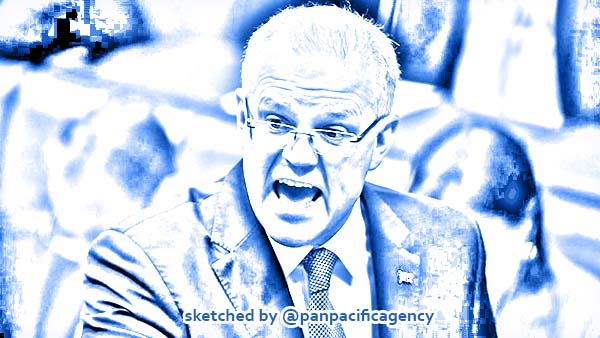[Analytics] Australia must get better at picking its fights with China

Prime Minister Scott Morrison has recorded a video which sends a strong message to people smugglers about Australia's zero tolerance policy to illegal boats. (AAP). Sketched by the Pan Pacific Agency.
Everyone loves a David and Goliath story. That is why we have all been cheering plucky little Canberra for standing up to the big bullies in Beijing. But how does the story end? In the Bible, David strides triumphant over the humbled Goliath. In reality it is much more likely that David gets a sharp lesson in the realities of raw power. Hugh White specially for the East Asia Forum.
But it is too late to back out now. China’s crude threats of economic retaliation have made it impossible for the Morrison government to abandon its proposal for an independent international enquiry. That would make it look pathetic.
But we need to ask how Australia found itself in a stoush with China that it cannot abandon and cannot win, and try to learn some lessons for the future. Because Australia is going to face this kind of problem again, often, in the new Asia of the 21st century.
The first lesson for Australia is to not needlessly antagonise China, especially when it needs their cooperation. However good it may feel, Australia’s bold defiance of Beijing has been spectacularly counterproductive.
Australia’s goal is to ensure that the world learns all it can about how this pandemic began, which makes perfect sense. But the Morrison government framed its call for an independent enquiry as an investigation of Beijing’s culpability for the outbreak. That was a major blunder, because it guaranteed that China would reject the idea out of hand. And without China’s cooperation, we will never learn what really happened in Wuhan in November and December last year.
It is probably true that China deserves blame for mismanaging the outbreak when the virus first appeared. But that’s not the point. Effective diplomacy is not about saying what you think is true. It is about saying what you need to say — and not saying what you don’t need to say — to get a result. By saying what they did, the Australian government made sure that they wouldn’t get the enquiry they were after. And that hurts the world’s ability to manage the next pandemic better.
Why did the Morrison government make such an obvious blunder? Until now Scott Morrison has been very careful in his dealings with Beijing, trying to make sure that the tense ‘deep freeze’ he inherited from his predecessor doesn’t get any worse. It is strange that he chose this moment to turn confrontational when the pandemic so obviously calls for cooperation.
The most likely explanation is that he did it to please Washington. The Trump administration is plainly determined to talk up China’s responsibility for the pandemic, both to deflect domestic criticism of its own woeful and at times farcical mismanagement of the crisis, and to score points against Beijing in their escalating geopolitical contest for influence in Asia and globally.
It is easy to imagine the White House urging Canberra to help out by joining their chorus of accusations against Beijing. Agreeing to do so would certainly accord with the recent call from Australia’s new ambassador in Washington, Arthur Sinodinos, to do whatever Australia can to help the United States ‘push back’ against China.
But that is only sensible if Washington is acting wisely, with a credible strategy that serves Australia’s interests. That means managing China’s assertiveness without unnecessarily exacerbating tensions or precluding cooperation where it is needed. Alas, there is no evidence of that from the Trump White House, or anywhere else in Washington. On the contrary, the pandemic has further stoked the rising anger towards China across the political spectrum in the United States — mirrored by rising Chinese animosity towards the United States.
All this is making it harder to see how this all-important relationship can be managed in the future. Indeed the risk of a catastrophic US–China conflict is increasing sharply. Washington shares the blame for this, and so does Australia if it encourages them and echoes their messages. So the second lesson Australia should learn from the current crisis in its relations with Beijing is not to allow its policy on China to be dictated from Washington.
And the third lesson? Australia needs to wake up to the new realities of power in Asia and learn how to navigate them. The so-called ‘rules-based global order’ has not replaced the exercise of raw power in international affairs. And the power is now in new hands.
For the first time in Australia’s history, the most powerful country in Asia, and the most important country in the world to Australia, is not an ally, nor even a friend. It is a country that views Australia coolly, at best. Nothing in Australia’s experience has taught it how to deal with a country like this.
And let’s not delude ourselves that China has blundered by threatening Australia. Of course, it hasn’t made Australia like it, but that is not what China wants. China wants to display its power by showing Australia, and others, that it can impose big costs on Australia at low cost to itself. That is the essence of power in international relations, and the Chinese have it in abundance.
So, whether Australia likes it or not, it now faces hard choices whenever it wants to oppose China. As a sovereign state, Australia has the right to do as it wishes, but it must accept the consequences of its choices. It is Australia’s sovereign right to criticise China, and China’s sovereign right to retaliate. No one likes to be pushed around, especially by a known bully, but power has its own logic which cannot be denied. So Australia needs to learn to pick its fights.
Hugh White is Emeritus Professor at the Strategic and Defence Studies Centre, The Australian National University.